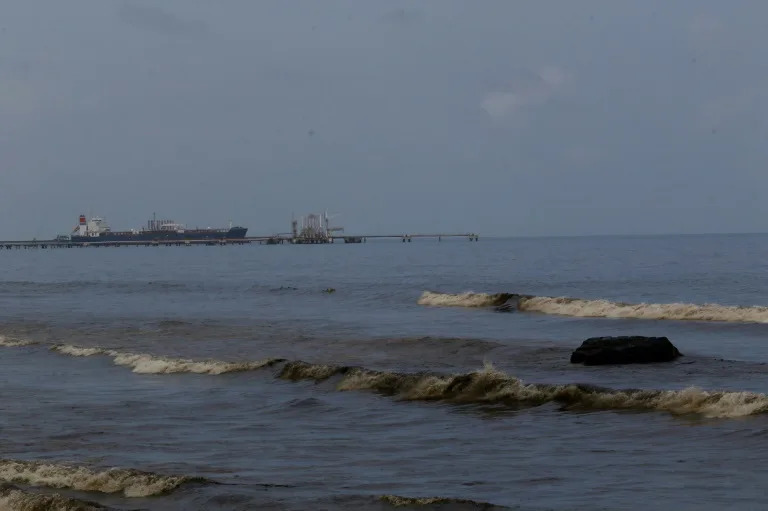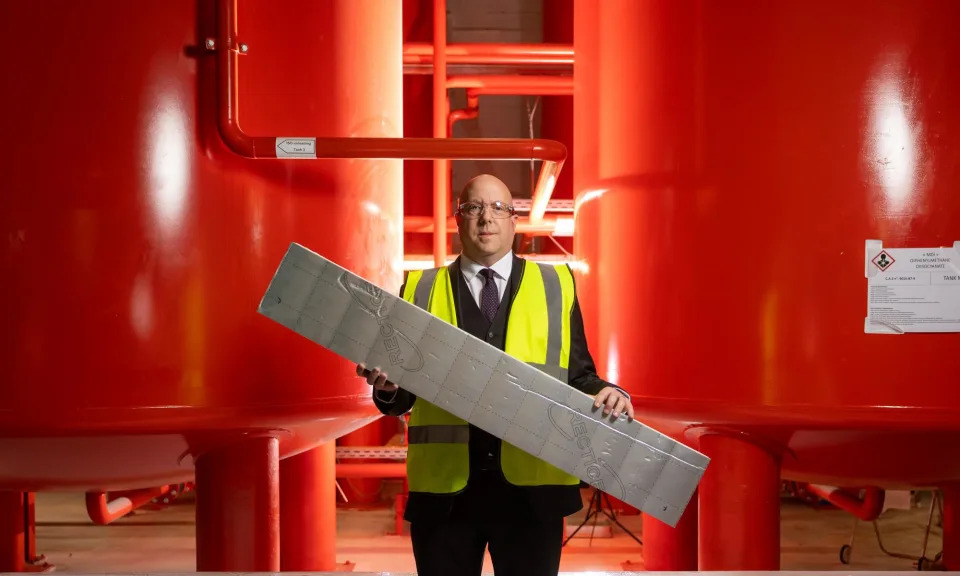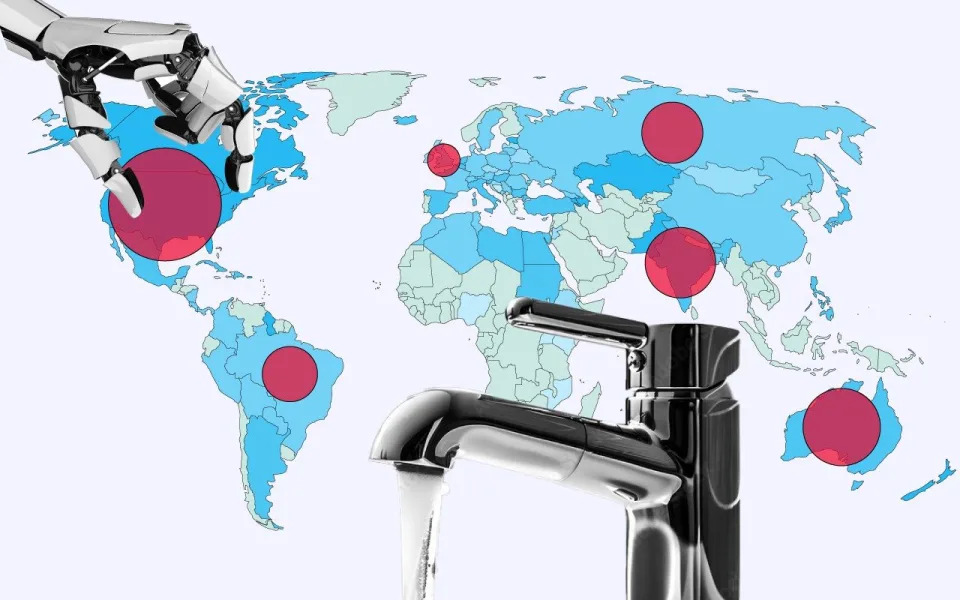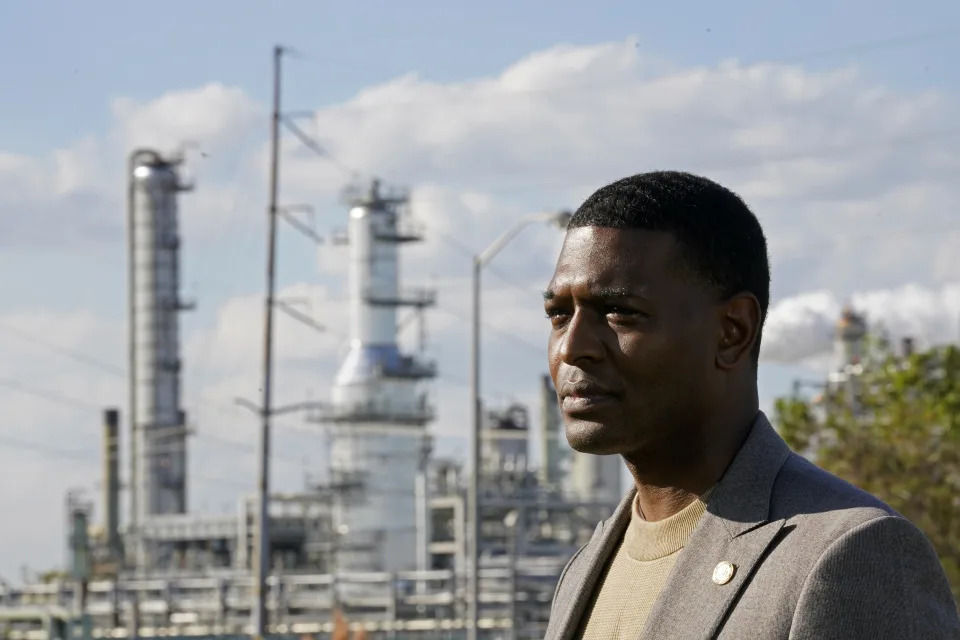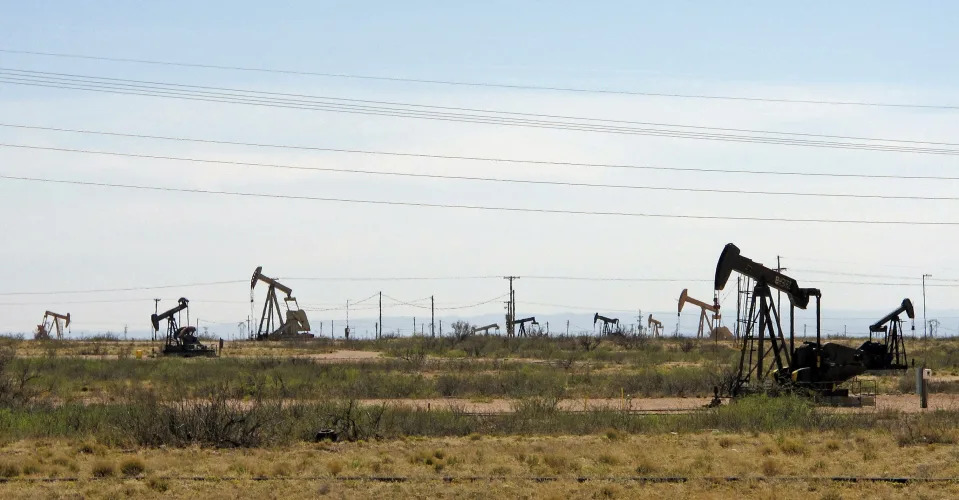NOT A LIBERTARIAN HE'S A FASCIST
Maria Eloisa Capurro
Thu, December 28, 2023

(Bloomberg) -- President Javier Milei will face his first general strike after just more than a month in office as Argentina’s top unions call for a nationwide protest against his plans to deregulate the country’s economy, change its voting system and reduce social safety nets.
Workers will stop across the country on Jan. 24 to protest Milei’s measures, according to an announcement on Thursday from the CGT, one of Argentina’s oldest and most powerful union groups. They plan to take to the streets around congress in Buenos Aires to fight an “illegal” decree to deregulate the economy signed by the president last week, union leader Hector Daer said in a speech.
The strike will be the biggest test yet to Milei’s plans to reduce the hand of the state in Argentina’s crisis-prone economy. It is also the fastest called by CGT after the inauguration of a new president in the past 40 years, according to local media. The government on Wednesday sent to congress a wide-ranging bill with hundreds of proposals spanning from the elimination of Argentina’s primary elections to the privatization of 41 state-owned companies.
Read More: Milei Blitzes Argentina’s Congress With Far-Ranging Reform Bill
The bill, several hundred pages long, gives Milei additional powers to decide on economic policy throughout his term.
With less than a month in office, the new government is already facing a series of street protests after announcing the end of price controls, sharp spending cuts and a more than 50% devaluation of the Argentine peso.
The general strike by unions connected to the Peronist movement now in the opposition would also test the hard-line approach of Security Minister Patricia Bullrich, who recently announced a series of measures to limit protests and street blockades carried out without a permit.
Saskia O'Donoghue
Thu, December 28, 2023

Argentines protest against Milei's 'mega-decree' imposing austerity
Thousands of Argentines have taken to the streets of Buenos Aires to protest a decree of sweeping economic reform and deregulation proposed by newly-elected President Javier Milei.
Marching at the behest of labour unions, the protesters demanded the courts intervene to invalidate the mega-decree they say would carve away at worker and consumer protections.
Congress is sitting in an extraordinary session this week, at the request of ultra-libertarian Milei - in office since 20 December 10 - to consider the plan.
The decree would change or scrap more than 350 economic regulations in a country accustomed to heavy government intervention in the market.
Among others, it abolishes a price ceiling on rent, eliminates some worker protections and scraps laws shielding consumers from abusive price increases at a time annual inflation exceeds 160% and the poverty level has surpassed 40%.

Members of the Argentine Workers' General Confederation and social organisations protest against the economic reforms of Argentine President Javier Milei - Matias Baglietto/NurPhoto via Getty Images
A number of civic groups have recently filed a judicial motion to have the decree declared unconstitutional.
On Wednesday, protesters waved Argentine flags and placards reading: "The homeland is not for sale."
"We do not question the legitimacy of President Milei, but we want him to respect the division of powers. Workers need to defend their rights when there is an unconstitutionality," construction union leader Gerardo Martinez told reporters at the march.
What might happen to Argentina after Milei's mega-decree?
Milei's "chainsaw plan" to cut state spending has triggered a series of street protests against the government.
Other aspects of the decree include an end to automatic pension increases, restrictions on the right to strike - and easing away from price caps for private health services.
It also terminates some 7,000 civil service contracts.
Unless Congress scraps the plan in its entirety, the decree will enter into force on Friday.
Milei's far-right party, Freedom Advances, has 40 of the 257 deputies in Congress and seven of 72 senators.
"The decree is destructive of all labour rights," 45-year-old teacher Martin Lucero, who took part in the protest, said.
"The Argentine people chose Milei as president of the nation, not as emperor," he added.

Milei Brings His Chainsaw to Argentina's Regulatory State
Katarina Hall
Fri, December 29, 2023 at 5:15 AM MST·3 min read

Javier Milei | JUAN MABROMATA / GDA Photo Service/Newscom
A little more than two weeks after assuming office, Argentinian President Javier Milei on Wednesday presented his most extensive reform bill to Congress aimed at deregulating South America's second-largest economy.
The 351-page bill includes 664 articles aimed at deregulating and modifying laws pertaining to several sectors, including labor, commercial, real estate, aeronautics, and health. According to Milei, the omnibus bill contains two-thirds of all of his reform proposals.
"Argentina is immersed in a serious and deep economic, financial, fiscal, social, pension, security, defense, tariff, energy, health and social crisis without precedent, which affects all levels of society and the very functioning of the State," the bill states.
These crises were caused by "an innumerable number of restrictions on the exercise of constitutional rights, especially those of trading, working, and exercising lawful industry," the bill continues, adding that these restrictions "severely limit competition" and "artificially distort prices" while "burdening the real income of citizens."
The first measure in the bill calls for the declaration of "a public emergency in economic, financial, fiscal, pensions, defense, tariff, energy, health, administrative, and social matters until December 31, 2025." If approved, this would mean that Milei would have both the executive and legislative powers and would be able to decide on issues that are currently only regulated by Congress. The measure can be extended for up to two years.
An entire chapter of the bill is dedicated to privatizing several state-owned companies in order to generate "greater competition and economic efficiency, reduce the tax burden, improve the quality of services, promote private investment and professionalize management." The bill mentions 41 companies it proposes to privatize, including the flagship airline Aerolíneas Argentinas, the oil company YFP, the country's largest bank, Banco de la Nación, the news agency Télam, the water company AYSA, the Argentine mint, and the country's rail system.
Milei's proposal aims to simplify, digitalize, and de-bureaucratize the administration "to promote transparency and due administrative process…to obtain efficient regulations for market competitiveness, job creation, and everything that contributes to raising the standard of living of citizens."
The bill proposes to eliminate the primary elections and switch to a single-ballot system. It also seeks to move the chamber of deputies from a system that determines the number of representatives proportionally with the population to one of single-member constituencies.
The bill also extends the government's new anti-protest measures, increasing penalties to up to four years in prison for those who use arms to disrupt public transportation and up to five years for those who "direct, organize, or coordinate a meeting or demonstration that impedes, hinders or obstructs circulation."
Another chapter specifically addresses oil and seeks to ensure affordable oil supplies by leaving prices up to the market. Currently, the government can meddle in crude and gasoline prices, according to Bloomberg. The new bill will not allow the executive branch "to intervene, or fix, prices in the domestic market."
Other measures in the bill include the resale of sports tickets with "no limit to the number of times such operation may be carried out;" the authorization of self-driving cars for individuals, passengers, or cargo; abolishing price ceilings on rent; easing price caps for private health services; and "express divorces."
The measures will be reviewed by Congress during the extraordinary sessions that began this week and will last until January 31. But Milei's opposition, which holds the majority of seats in Congress, has vowed to not let the decree pass. Meanwhile, protests have sprung up in response to the omnibus bill. Several social organizations took to the streets in Buenos Aires, and Argentina's main labor union called for a general strike on January 24 in protest against the reforms.
Should Milei's sweeping reforms pass, Argentina would move from being one of the world's most regulated economies to a deregulated, free market economy that could reverse decades of government failure.
The post Milei Brings His Chainsaw to Argentina's Regulatory State appeared first on Reason.com.
Explainer-What is in Javier Milei's sweeping Argentina reform bill?
Lucinda Elliott and Jorgelina do Rosario
Updated Fri, December 29, 2023

Argentine presidential candidate Javier Milei closes his political campaign in Buenos Aires
By Lucinda Elliott and Jorgelina do Rosario
(Reuters) - Argentine President Javier Milei has sent a reform bill to Congress proposing far-reaching changes to the country's tax system, electoral law and public debt management.
The push to reshape South America's second-largest economy with an omnibus bill requires approval from lawmakers in both chambers of Congress, where Milei's coalition holds a small minority of seats.
WHAT ARE THE MAJOR REFORMS IN THE BILL?
The bill has 664 articles that range from allowing the privatization of 41 public companies, eliminating the presidential primary vote and introducing a broad 15% tax on most exports.
The government also proposed raising export taxes for soy and its derivatives to 33% from 31%. Argentina is the world's No. 1 exporter of processed soy.
The bill aims to introduce tax amnesties for Argentines, allowing them to register and repatriate some undeclared assets such as stocks, cryptocurrencies and cash.
A reform to public debt management would remove limits on sovereign bonds issued overseas and eliminate some conditions on restructuring debt.
Changes to Argentina's proportional representation electoral system would raise the number of lawmakers in each district to one per 161,000 inhabitants, from one per 180,000 inhabitants. This would give more power to the populous province of Buenos Aires in the lower house of Congress, according to a note to clients by consultancy firm 1816.
Among the more controversial reforms cited, is a call to cede some legislative power to the presidency until Dec. 31, 2025, with the option to extend these for a further two years.
WHAT ABOUT MILEI'S PRESIDENTIAL DECREE?
Markets cautiously welcomed a presidential decree from Milei last week to deregulate the economy, which came into effect on Dec.29 and also introduces wide-ranging reforms such as the end to export limits.
That decree must go before a legislative commission to weigh its constitutionality. It will remain in force unless both Congress and the Senate vote it down.
Unlike the reform bill, the presidential decree does not include changes to the tax and the electoral system, which must be put to congressional debate under Argentina's constitution.
HOW LONG COULD IT TAKE TO PASS THE REFORM BILL?
Milei's government sent the bill to Congress on Wednesday and has called for extraordinary sessions to fast-track its reform agenda.
The extraordinary sessions are scheduled through Jan. 31, shortening the usual recess until March. Lawmakers will set up commissions to analyze the proposals, which may include input from experts and government officials.
Several of the measures proposed require an absolute majority, such as electoral reform, which analysts warn could slow the process down. There is no set timeline stipulated for the bill to be debated.
HOW STRONG IS THE GOVERNMENT'S POSITION IN CONGRESS?
Milei's coalition, La Libertad Avanza, controls only 15% of seats in the lower house, so must rally support to move forward.
If eventually approved by the lower house, the bill moves to the Senate, where the government is even weaker, with less than 10% of seats.
Given his lack of a strong party or a majority in either chamber, analysts warn that Milei faces an uphill battle to advance his reform agenda.
"My doubt is whether Milei is open to accepting changes, or whether he wants the bill to pass without accepting any amendments," said Ignacio Labaqui senior analyst at Medley Global Advisors in Buenos Aires. "If he goes for the second option, he is literally declaring war on the legislative branch and has a high chance of losing."
Opposition movements have organized demonstrations against Milei's agenda in several cities since he took office Dec. 10.
(Reporting by Lucinda Elliott in Montevideo and Jorgelina do Rosario in London. Editing by Brad Haynes and Alistair Bell)
Argentina formally announces it won't join the BRICS alliance in Milei's latest policy shift
Associated Press
Fri, December 29, 2023

President-elect Javier Milei waves during a joint session of Congress to officially declare him and his running mate winners of the presidential runoff election, in Buenos Aires, Argentina, Wednesday, Nov. 29, 2023.
Maria Eloisa Capurro
Thu, December 28, 2023

(Bloomberg) -- President Javier Milei will face his first general strike after just more than a month in office as Argentina’s top unions call for a nationwide protest against his plans to deregulate the country’s economy, change its voting system and reduce social safety nets.
Workers will stop across the country on Jan. 24 to protest Milei’s measures, according to an announcement on Thursday from the CGT, one of Argentina’s oldest and most powerful union groups. They plan to take to the streets around congress in Buenos Aires to fight an “illegal” decree to deregulate the economy signed by the president last week, union leader Hector Daer said in a speech.
The strike will be the biggest test yet to Milei’s plans to reduce the hand of the state in Argentina’s crisis-prone economy. It is also the fastest called by CGT after the inauguration of a new president in the past 40 years, according to local media. The government on Wednesday sent to congress a wide-ranging bill with hundreds of proposals spanning from the elimination of Argentina’s primary elections to the privatization of 41 state-owned companies.
Read More: Milei Blitzes Argentina’s Congress With Far-Ranging Reform Bill
The bill, several hundred pages long, gives Milei additional powers to decide on economic policy throughout his term.
With less than a month in office, the new government is already facing a series of street protests after announcing the end of price controls, sharp spending cuts and a more than 50% devaluation of the Argentine peso.
The general strike by unions connected to the Peronist movement now in the opposition would also test the hard-line approach of Security Minister Patricia Bullrich, who recently announced a series of measures to limit protests and street blockades carried out without a permit.
Argentines protest against Milei's 'mega-decree' imposing austerity
Saskia O'Donoghue
Thu, December 28, 2023

Argentines protest against Milei's 'mega-decree' imposing austerity
Thousands of Argentines have taken to the streets of Buenos Aires to protest a decree of sweeping economic reform and deregulation proposed by newly-elected President Javier Milei.
Marching at the behest of labour unions, the protesters demanded the courts intervene to invalidate the mega-decree they say would carve away at worker and consumer protections.
Congress is sitting in an extraordinary session this week, at the request of ultra-libertarian Milei - in office since 20 December 10 - to consider the plan.
The decree would change or scrap more than 350 economic regulations in a country accustomed to heavy government intervention in the market.
Among others, it abolishes a price ceiling on rent, eliminates some worker protections and scraps laws shielding consumers from abusive price increases at a time annual inflation exceeds 160% and the poverty level has surpassed 40%.

Members of the Argentine Workers' General Confederation and social organisations protest against the economic reforms of Argentine President Javier Milei - Matias Baglietto/NurPhoto via Getty Images
A number of civic groups have recently filed a judicial motion to have the decree declared unconstitutional.
On Wednesday, protesters waved Argentine flags and placards reading: "The homeland is not for sale."
"We do not question the legitimacy of President Milei, but we want him to respect the division of powers. Workers need to defend their rights when there is an unconstitutionality," construction union leader Gerardo Martinez told reporters at the march.
What might happen to Argentina after Milei's mega-decree?
Milei's "chainsaw plan" to cut state spending has triggered a series of street protests against the government.
Other aspects of the decree include an end to automatic pension increases, restrictions on the right to strike - and easing away from price caps for private health services.
It also terminates some 7,000 civil service contracts.
Unless Congress scraps the plan in its entirety, the decree will enter into force on Friday.
Milei's far-right party, Freedom Advances, has 40 of the 257 deputies in Congress and seven of 72 senators.
"The decree is destructive of all labour rights," 45-year-old teacher Martin Lucero, who took part in the protest, said.
"The Argentine people chose Milei as president of the nation, not as emperor," he added.
Milei Brings His Chainsaw to Argentina's Regulatory State
Katarina Hall
Fri, December 29, 2023 at 5:15 AM MST·3 min read

Javier Milei | JUAN MABROMATA / GDA Photo Service/Newscom
A little more than two weeks after assuming office, Argentinian President Javier Milei on Wednesday presented his most extensive reform bill to Congress aimed at deregulating South America's second-largest economy.
The 351-page bill includes 664 articles aimed at deregulating and modifying laws pertaining to several sectors, including labor, commercial, real estate, aeronautics, and health. According to Milei, the omnibus bill contains two-thirds of all of his reform proposals.
"Argentina is immersed in a serious and deep economic, financial, fiscal, social, pension, security, defense, tariff, energy, health and social crisis without precedent, which affects all levels of society and the very functioning of the State," the bill states.
These crises were caused by "an innumerable number of restrictions on the exercise of constitutional rights, especially those of trading, working, and exercising lawful industry," the bill continues, adding that these restrictions "severely limit competition" and "artificially distort prices" while "burdening the real income of citizens."
The first measure in the bill calls for the declaration of "a public emergency in economic, financial, fiscal, pensions, defense, tariff, energy, health, administrative, and social matters until December 31, 2025." If approved, this would mean that Milei would have both the executive and legislative powers and would be able to decide on issues that are currently only regulated by Congress. The measure can be extended for up to two years.
An entire chapter of the bill is dedicated to privatizing several state-owned companies in order to generate "greater competition and economic efficiency, reduce the tax burden, improve the quality of services, promote private investment and professionalize management." The bill mentions 41 companies it proposes to privatize, including the flagship airline Aerolíneas Argentinas, the oil company YFP, the country's largest bank, Banco de la Nación, the news agency Télam, the water company AYSA, the Argentine mint, and the country's rail system.
Milei's proposal aims to simplify, digitalize, and de-bureaucratize the administration "to promote transparency and due administrative process…to obtain efficient regulations for market competitiveness, job creation, and everything that contributes to raising the standard of living of citizens."
The bill proposes to eliminate the primary elections and switch to a single-ballot system. It also seeks to move the chamber of deputies from a system that determines the number of representatives proportionally with the population to one of single-member constituencies.
The bill also extends the government's new anti-protest measures, increasing penalties to up to four years in prison for those who use arms to disrupt public transportation and up to five years for those who "direct, organize, or coordinate a meeting or demonstration that impedes, hinders or obstructs circulation."
Another chapter specifically addresses oil and seeks to ensure affordable oil supplies by leaving prices up to the market. Currently, the government can meddle in crude and gasoline prices, according to Bloomberg. The new bill will not allow the executive branch "to intervene, or fix, prices in the domestic market."
Other measures in the bill include the resale of sports tickets with "no limit to the number of times such operation may be carried out;" the authorization of self-driving cars for individuals, passengers, or cargo; abolishing price ceilings on rent; easing price caps for private health services; and "express divorces."
The measures will be reviewed by Congress during the extraordinary sessions that began this week and will last until January 31. But Milei's opposition, which holds the majority of seats in Congress, has vowed to not let the decree pass. Meanwhile, protests have sprung up in response to the omnibus bill. Several social organizations took to the streets in Buenos Aires, and Argentina's main labor union called for a general strike on January 24 in protest against the reforms.
Should Milei's sweeping reforms pass, Argentina would move from being one of the world's most regulated economies to a deregulated, free market economy that could reverse decades of government failure.
The post Milei Brings His Chainsaw to Argentina's Regulatory State appeared first on Reason.com.
Explainer-What is in Javier Milei's sweeping Argentina reform bill?
Lucinda Elliott and Jorgelina do Rosario
Updated Fri, December 29, 2023

Argentine presidential candidate Javier Milei closes his political campaign in Buenos Aires
By Lucinda Elliott and Jorgelina do Rosario
(Reuters) - Argentine President Javier Milei has sent a reform bill to Congress proposing far-reaching changes to the country's tax system, electoral law and public debt management.
The push to reshape South America's second-largest economy with an omnibus bill requires approval from lawmakers in both chambers of Congress, where Milei's coalition holds a small minority of seats.
WHAT ARE THE MAJOR REFORMS IN THE BILL?
The bill has 664 articles that range from allowing the privatization of 41 public companies, eliminating the presidential primary vote and introducing a broad 15% tax on most exports.
The government also proposed raising export taxes for soy and its derivatives to 33% from 31%. Argentina is the world's No. 1 exporter of processed soy.
The bill aims to introduce tax amnesties for Argentines, allowing them to register and repatriate some undeclared assets such as stocks, cryptocurrencies and cash.
A reform to public debt management would remove limits on sovereign bonds issued overseas and eliminate some conditions on restructuring debt.
Changes to Argentina's proportional representation electoral system would raise the number of lawmakers in each district to one per 161,000 inhabitants, from one per 180,000 inhabitants. This would give more power to the populous province of Buenos Aires in the lower house of Congress, according to a note to clients by consultancy firm 1816.
Among the more controversial reforms cited, is a call to cede some legislative power to the presidency until Dec. 31, 2025, with the option to extend these for a further two years.
WHAT ABOUT MILEI'S PRESIDENTIAL DECREE?
Markets cautiously welcomed a presidential decree from Milei last week to deregulate the economy, which came into effect on Dec.29 and also introduces wide-ranging reforms such as the end to export limits.
That decree must go before a legislative commission to weigh its constitutionality. It will remain in force unless both Congress and the Senate vote it down.
Unlike the reform bill, the presidential decree does not include changes to the tax and the electoral system, which must be put to congressional debate under Argentina's constitution.
HOW LONG COULD IT TAKE TO PASS THE REFORM BILL?
Milei's government sent the bill to Congress on Wednesday and has called for extraordinary sessions to fast-track its reform agenda.
The extraordinary sessions are scheduled through Jan. 31, shortening the usual recess until March. Lawmakers will set up commissions to analyze the proposals, which may include input from experts and government officials.
Several of the measures proposed require an absolute majority, such as electoral reform, which analysts warn could slow the process down. There is no set timeline stipulated for the bill to be debated.
HOW STRONG IS THE GOVERNMENT'S POSITION IN CONGRESS?
Milei's coalition, La Libertad Avanza, controls only 15% of seats in the lower house, so must rally support to move forward.
If eventually approved by the lower house, the bill moves to the Senate, where the government is even weaker, with less than 10% of seats.
Given his lack of a strong party or a majority in either chamber, analysts warn that Milei faces an uphill battle to advance his reform agenda.
"My doubt is whether Milei is open to accepting changes, or whether he wants the bill to pass without accepting any amendments," said Ignacio Labaqui senior analyst at Medley Global Advisors in Buenos Aires. "If he goes for the second option, he is literally declaring war on the legislative branch and has a high chance of losing."
Opposition movements have organized demonstrations against Milei's agenda in several cities since he took office Dec. 10.
(Reporting by Lucinda Elliott in Montevideo and Jorgelina do Rosario in London. Editing by Brad Haynes and Alistair Bell)
Argentina formally announces it won't join the BRICS alliance in Milei's latest policy shift
Associated Press
Fri, December 29, 2023

President-elect Javier Milei waves during a joint session of Congress to officially declare him and his running mate winners of the presidential runoff election, in Buenos Aires, Argentina, Wednesday, Nov. 29, 2023.
(AP Photo/Natacha Pisarenko)
BUENOS AIRES (AP) — Argentina formally announced Friday that it won't join the BRICS bloc of developing economies, the latest in a dramatic shift in foreign and economic policy by Argentina's new far-right populist President Javier Milei.
In a letter addressed to the leaders of Brazil, Russia, India, China and South Africa — all members of the alliance — Milei said the moment was not “opportune" for Argentina to join as a full member. The letter was dated a week ago, Dec. 22, but released by the Argentine government on Friday, the last working day of 2023.
Argentina was among six countries invited in August to join the bloc made up of Brazil, Russia, India, China and South Africa to make an 11-nation bloc. Argentina was set to join Jan. 1, 2024.
The move comes as Argentina has been left reeling by deepening economic crisis.
Milei's predecessor, former center-left president Alberto Fernandez, endorsed joining the alliance as an opportunity to reach new markets. The BRICS currently account for about 40% of the world’s population and more than a quarter of the world’s GDP.
But economic turmoil left many in Argentina eager for change, ushering chainsaw-wielding political outsider Milei into the presidency.
Milei, who defines himself as an “anarcho-capitalist” — a current within liberalism that aspires to eliminate the state — has implemented a series of measures to deregulate the economy, which in recent decades has been marked by strong state interventionism.
In foreign policy, he has proclaimed full alignment with the “free nations of the West,” especially the United States and Israel.
Throughout the campaign for the presidency, Milei also disparaged countries ruled “by communism” and announced that he would not maintain diplomatic relations with them despite growing Chinese investment in South America.
However, in the letter addressed to his counterpart Luiz Inácio Lula Da Silva in neighboring Brazil and the rest of the leaders of full BRICS members — Xi Jinping of China, Narenda Mondi of India, Vladimir Putin of Russia and Matamela Ramaphosa of South Africa — Milei proposed to “intensify bilateral ties” and increase “trade and investment flows.”
Milei also expressed his readiness to hold meetings with each of the five leaders.
BUENOS AIRES (AP) — Argentina formally announced Friday that it won't join the BRICS bloc of developing economies, the latest in a dramatic shift in foreign and economic policy by Argentina's new far-right populist President Javier Milei.
In a letter addressed to the leaders of Brazil, Russia, India, China and South Africa — all members of the alliance — Milei said the moment was not “opportune" for Argentina to join as a full member. The letter was dated a week ago, Dec. 22, but released by the Argentine government on Friday, the last working day of 2023.
Argentina was among six countries invited in August to join the bloc made up of Brazil, Russia, India, China and South Africa to make an 11-nation bloc. Argentina was set to join Jan. 1, 2024.
The move comes as Argentina has been left reeling by deepening economic crisis.
Milei's predecessor, former center-left president Alberto Fernandez, endorsed joining the alliance as an opportunity to reach new markets. The BRICS currently account for about 40% of the world’s population and more than a quarter of the world’s GDP.
But economic turmoil left many in Argentina eager for change, ushering chainsaw-wielding political outsider Milei into the presidency.
Milei, who defines himself as an “anarcho-capitalist” — a current within liberalism that aspires to eliminate the state — has implemented a series of measures to deregulate the economy, which in recent decades has been marked by strong state interventionism.
In foreign policy, he has proclaimed full alignment with the “free nations of the West,” especially the United States and Israel.
Throughout the campaign for the presidency, Milei also disparaged countries ruled “by communism” and announced that he would not maintain diplomatic relations with them despite growing Chinese investment in South America.
However, in the letter addressed to his counterpart Luiz Inácio Lula Da Silva in neighboring Brazil and the rest of the leaders of full BRICS members — Xi Jinping of China, Narenda Mondi of India, Vladimir Putin of Russia and Matamela Ramaphosa of South Africa — Milei proposed to “intensify bilateral ties” and increase “trade and investment flows.”
Milei also expressed his readiness to hold meetings with each of the five leaders.
Argentina pulls out of plans to join Brics bloc
Robert Plummer - BBC News
Fri, December 29, 2023

Mr Milei said his foreign policy "differs in many ways from that of the previous government"
Argentina's new President, Javier Milei, has withdrawn the country from its planned entry into the expanding Brics club of nations.
In a letter to the leaders of Brazil, Russia, India, China and South Africa, Mr Milei said decisions taken by the preceding government had been revised.
The Brics countries are often seen as a counterweight to the Western-led world.
Argentina had been among a much-vaunted new tranche of six countries poised to join the grouping next month.
It would have been admitted to the Brics club on 1 January, alongside Egypt, Iran, Ethiopia, Saudi Arabia and the United Arab Emirates.
What is the Brics group and which new countries are joining?
Its change of heart comes after Mr Milei, a populist right-wing outsider, won a surprise election victory in November with radical pledges to overhaul the South American nation's ailing economy.
He succeeded left-wing Peronist Alberto Fernández, whose views were more aligned with those of the bloc's existing members.
Mr Milei said in his letter that his government's foreign policy "differs in many ways from that of the previous government".
He added that although he did not consider it "appropriate" for Argentina to become a full Brics member, he was still committed to strengthening bilateral ties, particularly with the aim of increasing trade and investment flows.
Argentina begins 'shock therapy' by devaluing peso
First protests in Argentina against austerity plan
Although the Brics alliance is often portrayed as promoting a more multipolar world, it is economically dominated by China, which accounts for more than 70% of the bloc's combined GDP.
Argentina's bid for membership under Mr Fernández had the support of Beijing, but Mr Milei has strongly criticised China.
On the campaign trail, he described the Chinese government as assassins and said he would not work with communists.
Argentina's changing attitudes highlight the delicacy of its economic and political position as it struggles to reverse decades of economic mismanagement.
It is battling soaring inflation, with prices rising by about 150% over the last year. It is also struggling with low cash reserves and high government debt, while 40% of the population is living below the poverty line.
Mr Milei's administration has already devalued the country's currency by more than 50% as his plans for economic shock therapy begin to take effect.
Externally, Brics members Brazil and China are Argentina's two biggest trading partners, but the US is not far behind, making it imperative to preserve good working relations with all three.
And as a man who has contemplated replacing the Argentine peso with the US dollar, Mr Milei shows signs of inclining more towards Washington than Beijing in future.
Robert Plummer - BBC News
Fri, December 29, 2023

Mr Milei said his foreign policy "differs in many ways from that of the previous government"
Argentina's new President, Javier Milei, has withdrawn the country from its planned entry into the expanding Brics club of nations.
In a letter to the leaders of Brazil, Russia, India, China and South Africa, Mr Milei said decisions taken by the preceding government had been revised.
The Brics countries are often seen as a counterweight to the Western-led world.
Argentina had been among a much-vaunted new tranche of six countries poised to join the grouping next month.
It would have been admitted to the Brics club on 1 January, alongside Egypt, Iran, Ethiopia, Saudi Arabia and the United Arab Emirates.
What is the Brics group and which new countries are joining?
Its change of heart comes after Mr Milei, a populist right-wing outsider, won a surprise election victory in November with radical pledges to overhaul the South American nation's ailing economy.
He succeeded left-wing Peronist Alberto Fernández, whose views were more aligned with those of the bloc's existing members.
Mr Milei said in his letter that his government's foreign policy "differs in many ways from that of the previous government".
He added that although he did not consider it "appropriate" for Argentina to become a full Brics member, he was still committed to strengthening bilateral ties, particularly with the aim of increasing trade and investment flows.
Argentina begins 'shock therapy' by devaluing peso
First protests in Argentina against austerity plan
Although the Brics alliance is often portrayed as promoting a more multipolar world, it is economically dominated by China, which accounts for more than 70% of the bloc's combined GDP.
Argentina's bid for membership under Mr Fernández had the support of Beijing, but Mr Milei has strongly criticised China.
On the campaign trail, he described the Chinese government as assassins and said he would not work with communists.
Argentina's changing attitudes highlight the delicacy of its economic and political position as it struggles to reverse decades of economic mismanagement.
It is battling soaring inflation, with prices rising by about 150% over the last year. It is also struggling with low cash reserves and high government debt, while 40% of the population is living below the poverty line.
Mr Milei's administration has already devalued the country's currency by more than 50% as his plans for economic shock therapy begin to take effect.
Externally, Brics members Brazil and China are Argentina's two biggest trading partners, but the US is not far behind, making it imperative to preserve good working relations with all three.
And as a man who has contemplated replacing the Argentine peso with the US dollar, Mr Milei shows signs of inclining more towards Washington than Beijing in future.


